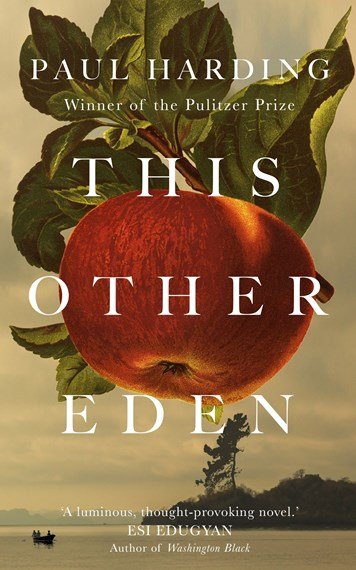It's curious to discover in this novel details about the true history of an island off the Maine coast which isn't far from where I grew up. Previously, I knew nothing about its tragic story. The opening of the book quotes from the Maine Coast Heritage Trust that in 1912 the state evicted a group of 47 mixed-race residents from the homes they'd inhabited for generations on Malaga Island. The subsequent story fictionalises an account of these residents through the time of that eviction as well as the cold-hearted and bigoted government process of expelling this group of people. Harding presents poetic descriptions of the islanders' everyday life and reflections on the families' history at this location which they'd inhabited since the Civil War as a haven isolated from the larger country. Passages about the residents are juxtaposed with formal accounts of events leading to the eviction and institutionalisation of some of the residents to emphasize the lack of consideration for the individuals and families whose lives were judged and displaced. It's ironically noted at one point that it's “Terrible how terribly good intentions turn out almost every time.” In this way the novel evokes a tremendous story of a community of unique individuals that forged its own path, but couldn't escape the morals and standards that the larger society imposed upon it.
Though the island community was viscously mistreated by the state, Harding doesn't idealise their lives or history. Any isolated group of people who try to subsist on their own especially on a relatively spare Northern island will encounter a hard life with limited shelter and meagre amounts of food. But there is also no outside help available for residents who experience debilitating illnesses or abuse from within the community. It's a complex situation and I admire how Harding simply presents this story in a way to allow readers to make up their own minds. I grew to care deeply about these characters – especially grandmother Esther Honey with her feisty spirit, the mysterious Zachary Hand To God Proverbs who dedicatedly carves the inside of an oak tree and her grandson Ethan who possesses natural artistic talent. Matthew Diamond is also an interestingly conflicted character. He teaches the children on the island, helps support the residents by delivering charitable donations and advocates on their behalf to the government. But he's also an acknowledged racist. The way he grapples with his own prejudices and religious feelings while interacting with the residents makes him a compelling intermediary between the state and the islanders.
Harding's prose flow beautifully in a way which fully embedded me in the sensory experience of their island life, relationships with each other and memories of the past. There's a gentle dignity to the narrative which makes the dictates of the state and “scientific” experts evicting them feel all the more cruel and hateful. It also makes occasional instances of horrific violence breathtakingly shocking. Being so isolated, the people on the island have also developed their own singular culture and way of communicating. The influence of their mixed European and African heritage through songs, stories, practices and legends is so unique. I enjoyed how this was integrated into their daily lives and dialogue. It left me feeling not only angry about the injustice carried out, but a sense that something very precious and special has been coldly decimated. I really appreciated this quietly dramatic story which says so much about belonging, family, spirituality and prejudice.








